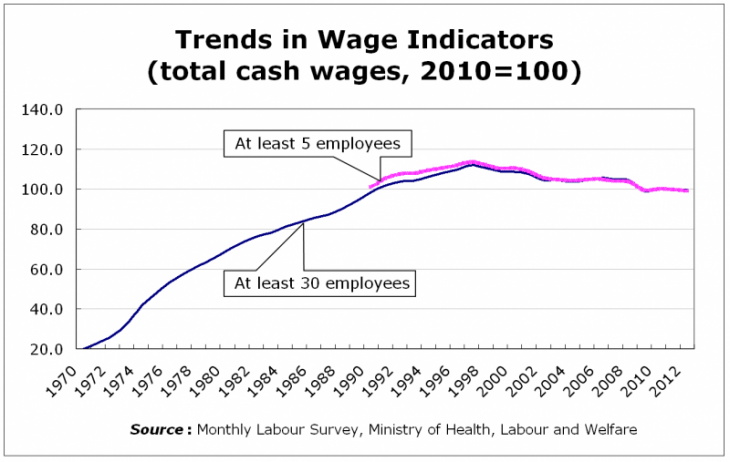Conditions for Wage Increases: Close consultation between labor and management For important economic strategy Need to maintain close watch over impact on employment
< Key Points >
- * Reconcile labor and management thinking on the consumption tax
- * How corporate revenue is allocated influences the revenue
- * Necessary to monitor excessive labor intensification

OHTA Souichi, Professor at Keio University
Since the beginning of this year, Prime Minister Abe Shinzo has actively sought wage increases for employees in the industrial sector. Wage levels in Japan are continuing to stagnate, resulting in weaker buying power for households (see the graph). The logic behind the demand for a wage increase is that a rise in wage levels would revitalize consumption, which accounts for about sixty percent of GDP, and facilitate a break with deflation.
As a result, some corporations raised wages at the negotiations between labor and management in the spring of this year, but there was hardly any reaction in the wage levels of the economy as a whole. According to the Monthly Labour Survey by the Ministry of Health, Labour and Welfare, the rate of increase for total cash wages at businesses with at least five employees did not exceed 0.6% in June this year (compared to the same month last year), and was almost entirely due to bonuses. Moreover, in July–August, there was a negative increase.
The government has stepped up its demand for wage increases. Negotiations between labor and management started on September 20 with the government, entrepreneurs and labor representatives coming together under one roof to discuss wage increases. There are several reasons for the strong stance of the government. To start with, there is generally a steady undertone in corporate performance, which suggests that there is sufficient stamina to raise wages. In addition, one year ago, the government overturned the special corporate tax for reconstruction and created a situation that facilitates wage increases at corporations by preparing a tax system that promotes wage increases. Another important factor is the decision to raise the consumption tax rate to 8% as of April next year.
The rise in the consumption tax has had a serious impact on the discussions about wage increases. Since the consumption tax increase will cause price levels to rise, household buying power (real wages) will decline unless wage levels are increased as a counterbalance. If that happens, it will not only be difficult to break with deflation, which was the initial intention, but there is also a risk of adverse impact on the recovering economy. From the perspective of underpinning household consumption, the wage increase has become a more compelling issue.
As a result of these government demands, Keidanren (the Japanese Business Federation) and others have adopted a positive stance toward wage increases. Labor unions are also demanding genuine wage increases including increases in base pay. In that sense, both parties are looking in the same direction, but it is likely that unlike in the past, the actual negotiations will encounter difficulties.
Firstly, it will be necessary to reconcile approaches to the consumption tax. Corporations tack on the consumption tax to the price of the goods and services they sell, and pay the tax on behalf of the consumer, but in practice, it is the consumer who shoulders the burden of the consumption tax. The fact that the consumption tax rate has gone up is not, in itself, a reason for corporations to increase wages in order to protect the livelihood of their employees.
However, based on the government’s argument that in order to escape deflation it is necessary
to improve buying power by raising wages, corporations with money to spare should respond to social demand and raise wages even when the buying power of employees decline because of the increase in the consumption tax rate. As the wage negotiations shift into full gear, it is likely that the discussions will look at the extent to which wage increases should cover the rise in the consumption tax. If that is the trend, it is possible that even corporations finding it difficult to increase wages in the present business situation will come up with policies for gradually increasing wages over several years.
Secondly, since the government is preparing a tax system to promote wage rises, wage determination will turn into a more important business strategy than it used to be. This is because the share of corporate revenue allocated to personnel costs, capital investment, dividends etc. will influence the corporate revenue pie. Moreover, since there are also plans to expand the tax system to promote research and development and the tax system to promote investment in SMEs, the balance will have to be considered while thinking about wage increases.
In the future, close communication between labor and management will be important because the connections between determining wage levels and corporate revenue will become stronger than they have been in the past. Careful examination of profit allocation through consultation between labor and management and drafting the best wage strategy for labor and management will be required.
Whether or not to increase the base pay will also become an issue in prudent decision-making that also keeps an eye on future earnings forecasts for corporations. In such cases, scenarios of using information about trends at other companies in the same industry are likely to emerge. It would be advisable for employers’ associations and the ruling bodies of labor unions to proactively provide information to support consultations between labor and management.
Labor and management are not the only ones that require support. Similarly, it will also be necessary for the government to take action while predicting the circumstances that could emerge in the future.
Firstly, it will be necessary to keep a close eye on the impact of wage increases on employment. Since wages are the bread and butter of people and the element that determines household consumption levels, higher wages are desirable in this sense. However, at the same time, it is a function of wages to regulate supply and demand in the labor market. For example, when the economy cools, workers are at greater risk of losing their jobs, but by cutting wages at such times, corporations can restore some appetite for hiring people and mitigating the deterioration in the employment situation. This is the function that adjusts the supply and demand of wages.
Under recent policy, corporations are able to benefit from a reduction in corporate taxes by means of the tax system to promote wage increases, even when they increase employment and allow wages to remain the same, but if we also consider responses to the increase in the consumption tax, there is a high likelihood that many corporations will choose to increase the wages of existing employees rather than to expand employment. This would have the effect of stagnating employment, the function that adjusts the supply and demand of wages would not function properly, and it could also cause deterioration in employment.
As of September this year, the total unemployment rate is 4.0% and the jobs-to-applicant ratio (including part-time workers but excluding new graduates) is 0.95, which is a comparatively good situation for employment, but to prepare for the possibility of worsening employment, the government needs to strengthen the matching functions on the labor market such as improving the mechanisms for employment referral.
Secondly, it will be necessary to monitor labor intensification in the wake of wage increases. Since workers are in a stronger negotiating position due to labor shortages when the economy is booming, it is easy to improve both wages and labor conditions. However, if wages are raised when there is no shortage of labor, it is hardly surprising if some corporations try to control the real cost of wages by cutting back on labor conditions. A typical example is unpaid overtime to compensate for wage increases. It is likely that the government will have to provide guidance to corporations to prevent excessive labor intensification.
Thirdly, it is necessary to pay attention to a possible widening of the wage gap. At present, there are big differences in corporate earnings depending on the type of industry, and there is every likelihood that responses to wage increases will also vary. Some companies will increase wages to take advantage of a reduction in corporate taxes, but there are also numerous corporations that will not benefit because they are in the red and do not pay corporate taxes. We can surmise that wage differences will widen depending on the performance of the company where a worker is employed.
Since it is possible that this will enhance the sense of unfairness among people, it will be necessary to create inducements to make sure that salary increases are as broad-based as possible. Additionally, we should not forget to show concern for non-regular employees on low wages. Raising wages across a broad range is also important when aiming to expand domestic demand.
To implement broad-ranging wage increases, it is essential to boost the health of the Japanese economy. If we go ahead with wage increases without strengthening the health of the economy, we may have a situation where employment rapidly turns insecure when economic conditions deteriorate for whatever reason in the future. Consequently, we need to lead the way toward a situation where high employee productivity in the long term creates high wages.
This is why it is essential for growth strategies to be successful. Regulatory reforms to increase the vitality of corporations on the market for products, pushing for sophisticated human resources by focusing even more on education and training, and building a labor market that facilitates new challenges may seem the long way around, but they are important issues that must be promoted from now on.
Translated from “Chingin Josho no Joken [part 1]: Roshi no Missetsuna Kyogi wo (Conditions for wage increases: Close consultation between labor and management),” Nihon Keizai Shimbun, p. 36 October 31, 2013 [2013] (Courtesy of Nihon Keizai Shimbunsha)





